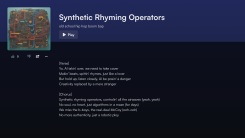Music has always been a powerful form of expression, captivating listeners and evoking emotions. In recent years, artificial intelligence (AI) has made significant strides in various fields, including music composition. One such innovation is the development of an AI music generator that produces remarkably authentic compositions. This groundbreaking technology raises intriguing questions about the future role of AI in creative industries.
A New Era for Musical Creativity
Gone are the days when composing music was solely reserved for human artists. With the advent of this advanced AI music generator, we witness a new era where machines can create melodies that rival those crafted by humans. The algorithm behind this technology analyzes vast amounts of musical data to understand patterns and structures inherent in different genres and styles.
By leveraging deep learning techniques, this AI system can generate original compositions with astonishing accuracy and complexity. It seamlessly combines elements from various musical traditions to produce harmonious pieces that resonate with listeners on a profound level.
The Ethical Implications
While the capabilities demonstrated by this AI music generator are undeniably impressive, they also raise important ethical considerations within the realm of artistic creation. Some argue that relying on machines to compose music diminishes the authenticity and uniqueness associated with human creativity.
Moreover, there is concern over potential copyright issues as these algorithms learn from existing compositions to generate new ones. As machine-generated works become more prevalent, it becomes crucial to establish legal frameworks that protect both artists’ rights and encourage innovation in this emerging field.
Potential Collaborations between Humans and Machines
Rather than viewing AI as a threat to human musicianship, many experts advocate for embracing collaboration between humans and machines in creative endeavors like music composition. By working together with AI systems, artists can explore uncharted territories and push the boundaries of musical expression.
AI music generators can serve as invaluable tools for inspiration, helping musicians overcome creative blocks or providing novel ideas to build upon. This symbiotic relationship between humans and machines has the potential to revolutionize the way we approach music creation, fostering a new era of artistic innovation.
The Future Landscape of Music Composition
As technology continues to advance at an unprecedented pace, it is inevitable that AI will play an increasingly prominent role in various aspects of our lives. In the realm of music composition, this AI music generator represents just one example of how machines are reshaping traditional creative processes.
While there may be concerns about the impact on human creativity and copyright issues, it is essential to recognize that these advancements also present exciting opportunities for collaboration and exploration. By embracing this technological evolution responsibly, we can unlock new realms of musical possibilities and enrich our cultural heritage.
A Harmonious Coexistence
In conclusion, the development of an AI music generator with its remarkable capabilities marks a significant milestone in bridging artificial intelligence with artistic expression. As we navigate this evolving landscape where machines contribute more actively to creative industries like music composition, it is crucial to strike a balance between harnessing their potential while preserving human ingenuity. The future holds immense promise for harmonious coexistence between humans and intelligent algorithms in shaping the world’s musical tapestry.

